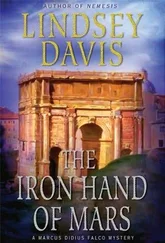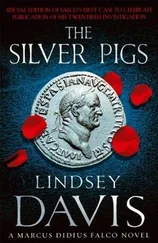Lindsey Davis - The Ides of April
Здесь есть возможность читать онлайн «Lindsey Davis - The Ides of April» весь текст электронной книги совершенно бесплатно (целиком полную версию без сокращений). В некоторых случаях можно слушать аудио, скачать через торрент в формате fb2 и присутствует краткое содержание. Год выпуска: 2013, ISBN: 2013, Издательство: Minotaur Books, Жанр: Исторический детектив, на английском языке. Описание произведения, (предисловие) а так же отзывы посетителей доступны на портале библиотеки ЛибКат.
- Название:The Ides of April
- Автор:
- Издательство:Minotaur Books
- Жанр:
- Год:2013
- ISBN:9781250023698
- Рейтинг книги:3 / 5. Голосов: 1
-
Избранное:Добавить в избранное
- Отзывы:
-
Ваша оценка:
- 60
- 1
- 2
- 3
- 4
- 5
The Ides of April: краткое содержание, описание и аннотация
Предлагаем к чтению аннотацию, описание, краткое содержание или предисловие (зависит от того, что написал сам автор книги «The Ides of April»). Если вы не нашли необходимую информацию о книге — напишите в комментариях, мы постараемся отыскать её.
The Ides of April — читать онлайн бесплатно полную книгу (весь текст) целиком
Ниже представлен текст книги, разбитый по страницам. Система сохранения места последней прочитанной страницы, позволяет с удобством читать онлайн бесплатно книгу «The Ides of April», без необходимости каждый раз заново искать на чём Вы остановились. Поставьте закладку, и сможете в любой момент перейти на страницу, на которой закончили чтение.
Интервал:
Закладка:
I did not bother writing out the tablet, but used it neat. I spent the rest of that day going round the funeral directors, to get at them ahead of the vigiles.
By dinnertime, my clothes reeked of myrrh and funeral cake but otherwise I had little to show. I talked to them all, pretending I had been hired to assist because the vigiles were overworked and also needed to disguise these enquiries by using a civilian. Calling myself an undercover consultant, I quoted Cassius Scaurus on the need to maintain public confidence. "He means, prevent panic and riots."
Everyone wants to avoid that. Funeral directors hate behaviour that interferes with their processions through the streets. The only riots they like are glorious ones that end with the Urban Cohorts rushing in to calm things down by beating people up, and doing it so hard they produce massed corpses. Even in Domitian's Rome such riots were rare.
The undertakers all swore it was impossible to identify for certain any victims of the random killer. However, all agreed there were increasing rumours. Those in the trade generally believed that people were dying of some undetectable malady, most times without even suspecting that something odd had happened to them. Some did wonder if foul play might be involved.
Undetectable maladies meant magic or poison in Rome. Both, possibly. I refused to believe in magic, but I might be dealing with people who did. I knew that according to vigiles lore, poison invariably meant any killer must be a woman, though I did not suggest that to anyone I spoke to. Male enquiry agents would seize on the idea, but I was cautious. There was no evidence. I prefer to make deductions based on material fact, not bend the facts to fit some pre-formed forensic theory. Especially when rather conservative paramilitary men had first devised the theory.
I ended up with just two likely-sounding cases. One was a lad, the other some rich woman's maid. Both died in March. I obtained addresses. It was really too late to turn up and ask questions, but I tried the mansion anyway.
A door porter who thought his job called for awkwardness refused me admittance. I accepted it quietly, knowing the best tactic was to turn up here again in daylight, when the staff would have changed. If I insisted now on making a fuss, this intransigent swine would mention my visit to his relief when they swapped places; if I held back, I stood more chance of charming my way past the relief slave tomorrow.
I took back the tablet to Morellus, who had gone off duty anyway. I respect "liaison." Considerately, I drew stars beside the undertakers who had been helpful.
I went home, hoping perhaps the archivist would visit again. Rodan said he had not seen him. I decided Andronicus was being heavily supervised by Faustus, the spoilsport magistrate.
I had picked up bread as I came home. I ate a simple supper, with the cheese Metellus Nepos gave me. I liked it. There were two kinds, both piquant and sustaining.
As my exhaustion faded, I began mulling. Sitting quietly at home, I reviewed what I knew and whether it was worth continuing. I was now sure a random street killer was on the loose, possibly with accomplices who ranged over a wide area. News was being censored from the sensational parts of the Daily Gazette. The aedile and the tribune had put their heads together and decided to keep me out of this. Scaurus had been deputed to warn me off, with orders to keep it civil: no open threats or violence. Hence he ridiculously tried olives and cake. Could I owe that courtesy to the aedile? It failed to make me like him.
Did these men really imagine a millefeuille and a fingerbowl of mint tea would buy my obedience? They were ridiculous. All they had done was to tell me that there really was something wrong. That instantly made me determined to plunge right in there, exploring.
Since my love life, though still promising, had lurched to a halt, I wrapped myself in a dark stole and took out food to leave for the fox I called Robigo. I did not see him or any of the others when I visited the Armilustrium. But later that night when the city grew quiet, I noticed an animal calling. The cry came from somewhere over towards the river. This time it was not screaming, but a single bark, repeated several times. Most people would have taken it for a domestic dog, but I could tell it was hoarser. I knew it was one of the foxes.
XIX
Next day I pursued the other possible case.
Lupus had been a fishmonger's boy working at a busy stall at the Trigeminal Porticus, down where you could hear the boats and smell the Tiber. He was fifteen, very fit, a little cheeky, the middle one of five brothers; his job was shucking oysters. According to his father, he was loveable and popular; everyone had liked him. That might be true. On the basis that no one was angrily pointing the finger of blame at anybody else, it seemed reasonable to believe the boy had had no enemies.
The father also reckoned Lupus had had no girlfriends. Since I noticed how the father's eyes followed, each time a woman passed the stall on her way to a nearby fountain, I did wonder if the allegedly pure Lupus had inherited any lustful tendencies, but I was prepared to accept that his life held no amours that might have caused a slighted girl to have it in for him.
The father seemed a shifty type; he and his clothes stank irretrievably of fish. Lupus himself may possibly have looked like a gilded demigod when viewed from the end of an alley by a girl who was optimistic, but I guessed that the dead boy had had a hard time attracting anyone to squeeze in close. He had probably died a virgin; the father was the kind who would regret that on his son's behalf.
People do surprise you though. The father had somehow persuaded some woman to bear him at least five children. The surviving four brothers, who all worked at the stall, looked alike, as if they shared one mother. I decided that poor soul must be a slave, who was not allowed to say no.
I knew it was the father who had raised with the undertaker the strange way Lupus died. I asked what had brought him to question his son's death.
Until that point the father alone had dealt with my enquiries, but now the four boys all left what they were doing and gathered round as well. I guessed this had been the subject of many family conversations. Their mood now was quiet; none of them clamoured stridently for justice, as some bereaved relatives would do. I quickly gained the impression they had never expected anyone to take the issue seriously. They had discussed their suspicions with the undertaker, but had not reported a crime to the vigiles. That was worrying. It could mean there were other cases which despondent families who distrusted the authorities were keeping to themselves.
I surveyed all members of the family while we were talking, in case one behaved differently from the rest, indicating he had harboured a reason to attack his brother. I saw no such behaviour.
The day Lupus died had seemed like any other day. He had been squatting on his low wooden stool, head bent over a bucket, shucking. He let out a yell and said something had nicked him. His brothers told me he was right because, being a close-knit, affectionate family, they all converged to take a look; they had seen a big bright bead of blood welling up on the back of his neck. He had been wearing a tunic with a wide, loose opening. I was shown this very garment. His younger brother Titus was now wearing it. There was even a rusty mark on the facing that they all said was a bloodstain. There seemed more blood than would normally happen after, say, an insect bite.
My young sisters would not take over a tunic worn by somebody who died, let alone wear it unwashed for the next three weeks, but when your skin, hair, sandals and every other thing about you stinks of your trade, I dare say you are not fastidious. I myself would now be carrying the odour of fishscales on my shoes for days, just from crossing the street to get here.
Читать дальшеИнтервал:
Закладка:
Похожие книги на «The Ides of April»
Представляем Вашему вниманию похожие книги на «The Ides of April» списком для выбора. Мы отобрали схожую по названию и смыслу литературу в надежде предоставить читателям больше вариантов отыскать новые, интересные, ещё непрочитанные произведения.
Обсуждение, отзывы о книге «The Ides of April» и просто собственные мнения читателей. Оставьте ваши комментарии, напишите, что Вы думаете о произведении, его смысле или главных героях. Укажите что конкретно понравилось, а что нет, и почему Вы так считаете.












